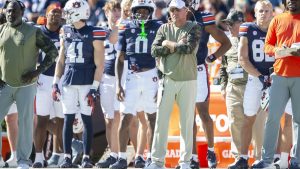
.Once Jay Woodcroft’s two-year tenure as an Edmonton Oilers head coach came to an end, the team did what it always does when it finds itself shorthanded on players and goes into neutral: it fired the man in the dugout.
content of the article
 By mid-November, the 31st-place Oilers looked certain to blow their season, so management provided yet another justification for this group, sacking defensive coach Dave Manson and Woodcroft and adding junior coach Kris Knoblauch, a former Oiler, and Connor McDavid.
By mid-November, the 31st-place Oilers looked certain to blow their season, so management provided yet another justification for this group, sacking defensive coach Dave Manson and Woodcroft and adding junior coach Kris Knoblauch, a former Oiler, and Connor McDavid.
“You can debate whether 12 or 13 games is enough, but I believe it’s probably too late if you wait another 10 games and nothing changes. Thus, Jeff Jackson, the CEO of hockey operations, and I believed that action was necessary.
With this, there have been 11 different head coaches in the previous 16 seasons. The current leadership group, which consists of Todd McLellan (266 games), Ken Hitchcock (62 games), Dave Tippett (161 games), and Woodcroft (133 games), has had five coaches in eight years and thirteen games.I’m hard-pressed to come up with a more scathing indictment of a dressing room and an organisation.
It also raises the question of how one does not examine the core of this hockey team in great detail. Given their skill, background, and everything they have on the line this season, it is a problem that needs to be addressed if it takes another coaching change to inspire them.
“I think in the core,” stated Holland. “Nobody has played more than five playoff rounds the last two years. We’ve advanced to the final four and final eight. We were in the top five or six in the league in points last year. I just felt we needed to make a change to jump-start our season. I don’t think it’s on the core. The core has done it over the last two years. We didn’t want to wait around any longer.” The Oilers are currently at the bottom of the league in their all too familiar state of turmoil, and in the wake of Sunday’s bloodshed, nearly everyone agrees that the problem is not the coaching.
In his brief tenure here, Woodcroft went 79-41-13, the sixth-best record in the league during that time. In his first playoff season, he finished 26-9-3 and advanced three rounds; in his second season, he finished 50-23-9 and advanced two rounds. Every time, it was the eventual Stanley Cup champions who eliminated them.
His terrible shortcoming, though, is that he failed to take a firm enough stance against a team that has never taken defensive and puck management duties seriously. This season, the team’s defense—not just in goal—took a serious hit, and he was unable to turn it around.





